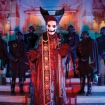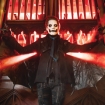Get Author & Punisher's new album, Krüller, on limited-edition colored vinyl at Revolver's shop.
Tristan Shone is a sound scientist like no other. He creates and performs under the ominous name Author & Punisher, building sounds that travel through industrial, doom and alternative metal, but his concerns aren't strictly limited to what can be heard. He also needs to feel the crushing force of the music in his hands, body and throat.
Some of that can be seen in the unique instruments built from electronics and steel he's invented and calls "Drone Machines," and in the black floor-to-ceiling dub-style sound system he has lining one wall of his San Diego workshop. To create the music he hears in his head, Shone works with large-scale tools of his own design, rejecting the usual plastic buttons and switches of computers and sequencers to truly embody the industrial aspect of his music.
You have a better connection to the tools, and a more intimate connection," says Shone, who has just released Author & Punisher's first new album in three years, Krüller, with guest appearances by Tool's Justin Chancellor and Danny Carey. "It has weight and has ball bearings." Later this year, he's also making versions of his Drone Machines available to other musicians for the first time, spreading his ideas wider.
Onstage, he looks like one of the laborers grappling with the gigantic machines in Fritz Lang's Metropolis. Shone's right hand grips a heavy device of metal and MIDI tech he calls Rails; it acts as a drum machine with multiple triggers beneath his fingers, as he shoves forward and back to make beats, blending the physical and electronic.
It would have been easy enough to program beats and other sounds on his computer, but the result would not be the same. "The whole reason I designed this stuff was so that I could play everything live. So I'm playing the drums, pressing these buttons and moving it back and forth," he says. "It falls behind, it goes in front of the beat. My pitch bends and things are never perfect." Just how he wants it.
The paradox of Author & Punisher is that the larger and heavier the machine in his hands is, the more the human element presents itself. Another machine, one he calls Ingot, includes a giant abacus bead made of solid metal that he slides along a rod to blend notes by hand. He's also performed in metal masks with built-in pistons and wrapped microphones tightly around his throat. The result is synthetic and strangely human, a musical take on one of H.R. Giger's biomechanical hybrids.

The next phase of his industrial revolution is Krüller, which came together partly as a result of the coronavirus and the premature end of his tour for 2018's Beastland. By March 2020, he'd already played five months' worth of shows behind that album, and had just ended a run as Tool's opening act, with 42 more solo shows scheduled for the year. Then the live music world froze in place and stayed that way for about 18 months. Shone spent the unexpected downtime at home creating new music.
He worked toward refining his approach without diminishing the raw power of his music, particularly with vocals. "The tendency of a lot of people in the industrial world is to throw distortion on everything," says Shone. "I got to the point where I was fried and I was doing it too much. So I basically took almost all the distortion off the vocals."
The result can be heard on Krüller's opening track, "Drone Carrying Dread," a song built from waves of deeply emotional sound and hard electronic beats that land like hammer blows. Shone sings of desperate times and a world at war, his vocals as melodic as classic Peter Gabriel. In lyrics inspired by Octavia E. Butler's post-apocalyptic novel Parable of the Sower, he warns: "A charade, the militia, crosses, uniforms, filling all the roles … The result, a pathetic collapse of the soul."
Later, "Maiden Star" is an especially personal song, Shone's vocal as agonized and vulnerable as Deftones singer Chino Moreno, the music heavy and stressed, with swelling moments of melody shining through. Shone's lyrics were fueled by connecting on a deepening level with his aging parents, his mother recently diagnosed with Alzheimer's, both increasingly isolated during the pandemic on a farm on the opposite side of the country. Shone says the experience has him "thinking about how fragile our comfort is right now."

Bleaker is "Centurion," featuring Tool's Chancellor on bass, with ominous swirls of electronics and Shone growling: "If you're feeling like you can't stand/Then get up and fucking run!" And "Incinerator" rages like a panicked document of 2020's year of pandemic, politics and protest, and the construction of a border wall near San Diego through Kumeyaay indigenous land. "They're blasting these sacred burial sites, and they're finding bones," says Shone, who attended one of the protests. "That's by far the most aggressive, heavy track on the album."
Raised in New Hampshire, Shone grew up with the melodic songs of classic rock and pop from the radio (Beatles, Zeppelin, CSNY, etc.), and then discovered metal in a big way during ninth grade after hearing Sepultura for the first time. Deeper inspiration came from the recordings of a certain breed of artist that, in the Nineties, began hitting the lowest end within reach: Lysol by the Melvins, Times of Grace by Neurosis, and Selfless by Godflesh. The masterworks were gorgeous and impenetrable. "I feel like I've been chasing that sound for a long time," he says.
Shone is a mechanical engineer and sculptor who graduated in 2000 from Rensselaer Polytechnic Institute, near Albany, New York. He played in metal bands for years, using traditional instrumentation, then had an epiphany: "Hey, I can use my engineering for art, as well."
Between tours, his day job is a mechanical engineering researcher at UC San Diego, working with physicists that develop technology for microscopes and other biology equipment. While the design of Shone's musical instruments don't generally require the same intense tech skills as a university research lab, he's used some of the same resources for both. "The machine shop where I get some of this lab stuff made is the same place I'll get my instruments made," he says. "When I go over there to get parts, I'm also like, 'So, you got my microphone built?"
On his first tour as Author & Punisher in 2007, he discovered a community of artists and fans on a similar wavelength along the West Coast, from San Diego to Portland. Years later, he connected with Tool as a result of playing Portland's Stumpfest, a gathering of heavy acts organized by Rynne Stump and her sister, Sarah. Rynne is married to Tool's Carey, who saw and liked what A&P was doing.

As Tool's opening act two years ago, Shone found more support than expected among the arena masses, despite an approach far outside the metal mainstream. "I was expecting a lot more hatred, to tell you the truth, at the Tool shows," he says, crediting the headliner for always embracing the weird, and for consistently challenging its audience through the years. "They've taken a lot of experimental people out on the road."
Shone has now created a company called Drone Machines that will begin offering consumer versions of his instruments this year. He acknowledges that "some people were kind of bummed that you might see other people playing this stuff out there." But expanding the reach of his inventions is in the classic tradition of guitarist Les Paul putting his own magnificent machine into the world — adopted and mastered by generations of players, from Jimmy Page to Slash and Adam Jones, and not one of them sounding like a copy of the inventor himself.
Not that Shone is stuck in place. His music and instruments continue to evolve, as he stretches out in both sound and feeling. On tour this year, he even has a guitarist on stage with him (Douglas Sabolick from Ecstatic Vision) for the first time since he began recording as Author & Punisher. And the stories in his songs are only growing more personal and humanlike, even as the machines around him become more formidable.
"It's called doom metal, for Christ's sake," he says. "Every band is like, 'This song's about the end of the world and our struggles.' And I promised myself … that I was not going to be as cynical on this album. Everything from the colors of the album to the sound and the language — I tried to make it more hopeful."








